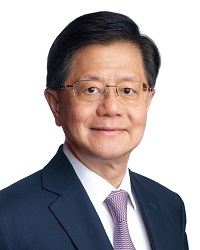Webinar Series
Blockchain without Crypto? Linking On-Chain Data Growth to Firm Fundamentals and Stock Returns
Despite the explosive growth of cryptocurrencies and decentralized finance, whether the underlying technology adds significant value and will thus sustain broad adoption remains unclear. Using proprietary data on firm-level blockchain records from 2015 to 2021, the authors conduct the first large-sample study linking blockchains to firm fundamentals and asset valuation in a country where cryptocurrencies are completely banned. The authors find that year-on-year quarterly blockchain data growth (BDG) contains value-relevant information for nowcasting and forecasting assets growth, sales growth, ROA, standardized unexpected earnings (SUE), and innovation outcomes measured through patents. BDG also predicts stock returns, especially around future earnings announcements, with a long-short BDG-sorted portfolio generating a 10.56% risk-adjusted return annually. The findings are robust across industries and regions, superior compared to other nowcasters, and hold in international samples. The authors further discuss the underlying economic channels (e.g., continuous disclosure and reduction in information asymmetry) and provide evidence for causality which are consistent with real-life use cases and heterogeneity analyses that reveal firms with greater information asymmetry, lower disclosure quality, and less public trust benefit more from blockchain adoption and on-chain data growth.
2022
Session Chair: Bernard YEUNG
Stephen Riady Distinguished Professor in Finance and Strategic Management, NUS Business School, National University of Singapore and President of ABFER
Lin William CONG, Rudd Family Professor of Management and Associate Professor of Finance, Samuel Curtis Johnson Graduate School of Management, SC Johnson College of Business, Cornell University
Co-author:
Ran CHANG, Assistant Professor of Finance, Antai College of Economics and Management, Shanghai Jiao Tong University
Greg BUCHAK, Assistant Professor of Finance, Stanford Graduate School of Business, Stanford University
Speakers
-

Lin William CONG
Rudd Family Professor of Management and Associate Professor of Finance, Samuel Curtis Johnson Graduate School of Management
Lin William CONG is the Rudd Family Professor of Management and Associate Professor of Finance at the Johnson Graduate School of Management at Cornell University, where he is the founding faculty director for the FinTech Initiative. He is also a Kauffman Foundation Junior Faculty Fellow, Poets & Quants World Best Business School Professor, and editorial board member for top business and finance journals such as the Management Science. Prior to joining Cornell, he was an assistant professor of Finance at the University of Chicago Booth School of Business where he created courses on “Quantimental Investment,” faculty member at the Center for East Asian Studies, doctoral fellow at the Stanford Institute for Innovation in Developing Economies, and George Shultz Scholar at the Stanford Institute for Economic Policy Research. He advised companies such as String Lab/Dfinity and DataYes and was consulted for the SEC's lawsuits against Telegram/TON and Kik/KIN. He is currently advising ChainLink, Blackrock, Modular Asset Management, among other industry leaders in FinTech and asset management.
Professor Cong’s research spans financial economics, information economics, FinTech and AI, and Entrepreneurship (theory and intersection with digitization and development). Widely recognized as a leading scholar for research on FinTech and the digital economy, Professor Cong has received numerous accolades such as the AAM-CAMRI-CFA Institute Prize in Asset Management, the CME Best paper Award, Finance Theory Group Best Paper Award, and has also been invited to speak or teach at hundreds of world-renowned universities, venture funds, investment and trading shops, and government agencies such as IMF, Asset Management Association of China, Alibaba, SEC, and federal reserve banks. He received his Ph.D. in Finance and MS in Statistics from Stanford University, and A.M. in Physics jointly with A.B. in Math and Physics from Harvard University. -

Greg BUCHAK
Assistant Professor of Finance, Stanford Graduate School of Business, Stanford University
Greg BUCHAK is an Assistant Professor of Finance at the Stanford Graduate School of Business. Buchak earned his PhD in Financial Economics at the University Chicago’s Department of Economics and Booth School of Business. He also received a JD from the University of Chicago Law School. Before graduate school, he was a quantitative trader and portfolio manager at Goldman Sachs and the Royal Bank of Canada. He received a BA in Mathematics and a BS in Economics at the University of Pennsylvania.
Buchak’s primary research field is in corporate finance. He is interested in issues related to financial technology, financial intermediation, consumer finance, and the interplay between the evolving industrial organization of the financial sector, regulation, and technological progress. -

Bernard YEUNG
Stephen Riady Distinguished Professor in Finance and Strategic Management, NUS Business School, National University of Singapore and President of ABFER
Bernard Yeung is Stephen Riady Distinguished Professor in Finance and Strategic Management at the National University of Singapore Business School. He is also the President of the Asian Bureau of Finance and Economic Research. He was Dean of NUS Business School from June 2008 to May 2019. Before joining NUS, he was the Abraham Krasnoff Professor in Global Business, Economics, and Management at New York University (NYU) Stern School of Business. He has also served as the Director of the NYU China House, the honorary co-chair of the Strategy Department of the Peking University Guanghua School of Management. From 1988 to 1999, he taught at the University of Michigan and at the University of Alberta from 1983 to 1988.
Professor Yeung has published widely in academic journals covering topics in Finance, Economics, and Strategy; his writing also appears in top-tier media publications such as The Financial Times, Economist, and The Wall Street Journal.
He won the Public Administration Silver Medal (2018) in Singapore, Irwin Outstanding Educator Award (2013) from the Academy of Management and is an elected Fellow of the Academy of International Business.
Professor Yeung was a member of the Economic Strategies Committee in Singapore (2009), a member of the Social Science Research Council (SSRC) in Singapore (2016-2018) and a member of the Financial Research Council of the Monetary Authority of Singapore (2010 -2013).
Professor Yeung sits on the 3rd Advisory Board of the Antai College of Economics and Management at Shanghai Jiao Tong University, the Advisory Council of the Economics and Management School of Wuhan University and the Advisory Committee of the Institute of Economics, Academia Sinica. Professor Yeung also serves as an independent Non-Executive Director of the Bank of China (BOC) Aviation Limited since 2016.
Professor Yeung received his Bachelor of Arts in Economics and Mathematics from the University of Western Ontario and his MBA and PhD degrees from the Graduate School of Business at the University of Chicago.
- 1
Session Format
Each session lasts for 1 hour 10 minutes (25 minutes for the author, 25 minutes for the discussion and 20 minutes for participants' Q&A). Sessions will be recorded and posted on ABFER's web, except in cases where speakers or discussants request us not to.
Registration
Registration has closed. Please visit the main page for details on next webinar.

